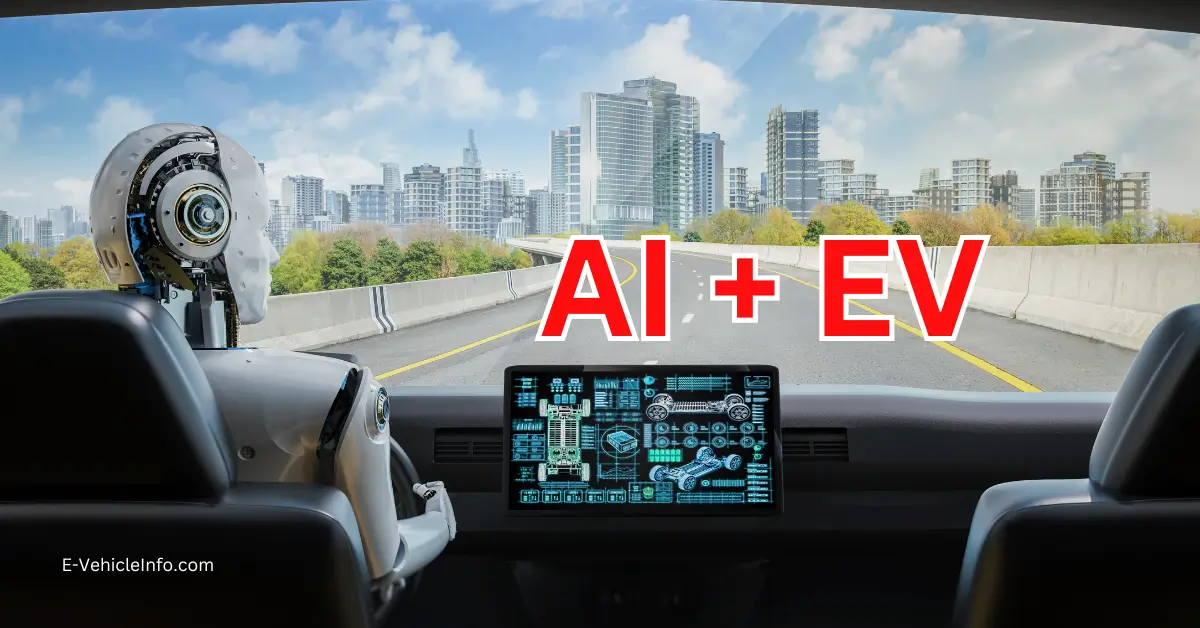
Integrating AI with electric vehicles is driving a technological revolution, particularly with the rapid progress in machine learning and deep learning algorithms.
This synergy between electric vehicles and artificial intelligence is paving the way towards developing intelligent systems for smarter, user-friendly advancements that cater to the evolving society’s demands.
This advancement addresses key social needs such as optimizing energy usage, enhancing safety, security measures, environmental sustainability, and providing a seamless user experience.
This ongoing disruption is driven by changing preferences, which range from connectivity and safety features to a growing emphasis on environmental sustainability. Governments worldwide are also introducing new regulations to align with the global shift towards greener practices.
Software is now playing a crucial role in various aspects of vehicles, from consumer-facing apps to supporting autonomous capabilities managing electrical and electronic systems. The rise of electric vehicles stands out as a driving force behind this industry revolution.
However, engineering electric vehicles efficiently and profitably while meeting consumer expectations poses a formidable challenge. This dynamic landscape underscores the necessity for continuous innovation and adaptation with the electric vehicle.
Artificial intelligence efficiently answers intricate real-world challenges that conventional computing methods struggle to tackle.
These intelligent vehicles driven by soft computing signify both a significant challenge and a promising prospect. As the development of future vehicles becomes increasingly intricate, the imperative for appropriate tools and cutting-edge technology becomes paramount.
The advancements of electric vehicles heavily rely on the progress of advanced battery technologies.
AI is instrumental in this pursuit by playing a substantial role in fine-tuning battery performance, prolonging its lifespan, and improving safety.
By employing AI algorithms, batteries can be continuously monitored for health, degradation can be predicted, and charging and discharging cycles to optimize overall battery efficiency.
Effective energy management is essential for electric vehicles, and AI offers smart solutions to optimize energy utilization.
By analyzing data from the vehicle itself, the power grid, and external sources, AI algorithms can determine the best charging and discharging methods for maximum efficiency.
This approach guarantees that EVs make the most of renewable electricity, minimize energy wastage, and contribute to lowering the overall carbon footprint.
An electric vehicle’s driving range hinges greatly on its battery’s energy density and the efficiency of its accompanying motor.
To ensure optimal performance, EVs employ a Battery Monitoring System that monitors critical metrics like temperature, energy usage, and charging status.
Real-time data analysis and rapid processing into useful suggestions yield the full extent of the range possible for the battery.
For these algorithms to be effective, they heavily rely on high-quality data and efficient processing times. Sophisticated sensors like accelerometers and probes within the vehicle collect precise data.
Recent advancements in edge computing, coupled with robust AI algorithms, significantly reduce processing delays.
Moreover, AI enhances motor efficiency by adjusting power output on current driving conditions and harnessing regenerative braking to extend battery life during braking or coasting.
Conventional charging setups often grapple with lengthy wait times and limited availability, challenges that AI adeptly tackles through real-time data analysis and demand prediction.
By assimilating user preferences, historical charging behaviors, and traffic dynamics, AI algorithms pinpoint optimal locations and capacities for charging stations.
Additionally, AI facilitates dynamic pricing models for these stations.
AI algorithms dynamically adjust charging rates by factoring in variables like electricity demand, time of day, and grid capacity, promoting off-peak charging.
This optimizes grid load and encourages EV owners to charge during low-demand periods, fostering efficient energy usage and lower electricity costs.
AI-powered charging infrastructure thus heralds a future of streamlined, cost-effective EV charging experiences.
Smart grids, designed to manage electricity supply and demand efficiently, are crucial for transitioning to clean energy and reducing costs.
However, the International Energy Agency (IEA) notes that current efforts must be revised to meet ambitious emissions reduction targets by 2050.
Integrating AI into smart grids could accelerate progress by leveraging real-time data from EVs, charging stations, and the grid itself.
AI algorithms could optimize EV charging schedules to minimize disruptions to grid stability, contributing significantly to the evolution of smart grids. Envision a scenario where EV charging stations anticipate your vehicle’s charging requirements.
Using AI, these stations predict your charging patterns based on your daily schedule, ensuring they are prepared to serve you precisely when needed.
This predictive capability reduces waiting times and enhances the overall convenience and user experience of charging your EV, making it seamlessly integrated into your routine.
AI presents a lucrative opportunity for charging station operators by enabling them to maximize their financial gains.
Through AI-driven predictions and data analysis, operators can strategically plan their business hours, ensuring optimal staffing and resource allocation during peak demand.
This boosts profitability and enhances the overall charging experience for users, creating a win-win situation for operators and EV owners.
AI-powered solutions provide innovative strategies to address the challenges of EV adoption and advancement, with key points summarised herein.
Montra Electric, the clean mobility brand from the prestigious Murugappa Group, has launched the All-New Super Auto, a next-generation electric…
Union Minister Nitin Gadkari (Minister of Road Transport and Highways of India) has once again made a bold statement that’s got…
India’s electric four-wheeler (E4W) market slowed in September 2025, following a record-breaking August, with 15,038 units sold, representing an 18%…
India’s EV market hit 1,04,056 electric two-wheeler sales in September 2025. TVS, Bajaj, and Ather led the chart, while Ola…
India's electric two-wheeler market is growing at a record pace. In July 2025, over 1.2 lakh electric two-wheelers were sold,…
The future of mobility in India has taken a major leap forward. Omega Seiki Mobility (OSM), led by Founder Uday…
This website uses cookies.